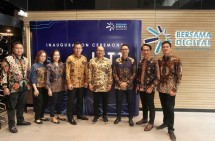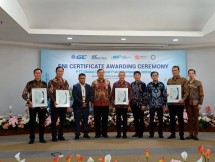Indonesia Strengthens Export Market of Coffee and Palm Oil Products in Egypt
By : Hariyanto And Aldo Bella Putra | Friday, December 08 2017 - 21:30 IWST

Delegasi RI melakukan kunjungan kehormatan ke Wisma Duta Besar KBRI Kairo
INDUSTRY.co.id - Jakarta - The Ministry of Trade (Kemendag) strengthens non-traditional export markets for coffee and palm oil products. The trade mission was led by the Director General of the National Export Trade Ministry of Trade, Arlinda which took place from 5-8 December 2017 in Cairo, Egypt.
"With this trade mission, Indonesia seeks to increase exports to non-traditional countries. Excellent products brought through this trade mission are coffee and palm oil. In addition, Indonesia also intends to identify potential and trade barriers between Indonesia and Egypt and strengthen trade relations between the two countries," explained Arlinda in a written statement on Wednesday (6/12/2017).
Total trade between Indonesia-Egypt in 2016 reached USD 1.46 billion with the value of Indonesia's exports amounted to US $ 1.1 billion and imports USD 352 million. Thus, Indonesia surplus US $ 758.3 million. Meanwhile, the total trade between the two countries from January to September 2017 reached US $ 1.12 million or a surplus for Indonesia of US $ 726.10 million.
Based on data from BPS, oil palm exports to Egypt in the same year reached USD 657.28 million. Of this amount, palm oil products contribute 60% to export trade in this Cairo-based State.
Meanwhile, Indonesian coffee exports to Egypt in 2016 reached USD 41.25 million. Indonesian coffee is the largest product purchased by Egyptian buyers at Trade Expo Indonesia 2017 with transaction amounting to USD 30 million.
"There are still many opportunities for coffee and palm oil exports to Egypt. For that, it is expected through this trade mission, we can increase exports of these two commodities even more to Egypt," said Arlinda.
This trade mission brings 15 Indonesian companies from various sectors, including palm oil, coffee, cocoa, pepper, paper and services (surveyors and mitesing, incentive, convention, and exhibition / MICE).
The main export of Indonesia to Egypt is palm oil, yarn of artificial staple fibres, margarine, coffee, pneumatic tires of rubber, coconut (copra), and uncoated paper. While Indonesia's main imports from Egypt include minerals / chemical fertilizers, aluminum calcium phosphates, molasses from the extraction of sugar, dates, and citrus fruits.
During the period 2011-2016 the value of Egyptian investment in Indonesia was recorded as many as 30 projects with an investment value of USD 4.32 million. While in the year 2017 (Q3) Egyptian investment recorded as many as 11 projects worth USD 474.20 thousand. Egypt's main investment is in the industrial sector (textiles, timber, and paper) and services sectors (trade and repairs, as well as hotels and restaurants).
"This trade mission is also a continuation of trade missions to other nontraditional markets by the previous ministry, namely to South Africa and Nigeria on 20-26 July 2017. In addition, with a population of 104 million people, Egypt is a very potential market," said Arlinda.
Various activities and meetings will be conducted in this series of trade missions. Business actors are scheduled to meet and interact with their business partners in Business Forum and One On One Business Matching activities. Businessmen will also visit coffee importers in Egypt.
In addition, Arlinda is scheduled to meet with First Undersecretary, Trade Agreement Sector, Ministry of Trade Egypt, Saied Abdallah. This meeting is intended to continue to strengthen bilateral relations between the two countries.
Currently, Egypt ranks 1st as the export destination of Indonesia to the African continent, or ranks the 26th destination of Indonesia's exports to the world. As the country imports Indonesia from the African continent, Egypt ranks 3rd Africa, or ranks 36th as a source of Indonesian imports from the world.
"With this trade mission, it is expected to minimize the existing trade barriers, so that exports to Egypt in particular, and exports to non-traditional countries in general can continue to increase," concluded Arlinda.
Read Also
ISPO to Leverage Palm Oil Competitiveness Level?
Rebranding Indonesian Palm Oil: A Lesson of Starbucks Traceability…
Ministry of Trade Holds 12th Gambir Trade Talk 'Indonesia's Foreign…
Wilmar International and LDC Visit Orangutan Conservation Area on…
Sawit Sumbermas Sarana Prioritizes Commitment to Protect the Environment…
Today's Industry

Kamis, 11 Juli 2024 - 22:08 WIB
Totolink Strengthens Commitment to Innovative and Reliable Network Solutions for Indonesia
Marking a strategic step, Totolink Indonesia proudly announces the enhancement of its head office in Jakarta, located at Harco Mangga Dua Blok E No.28, Sawah Besar, Central Jakarta.

Kamis, 11 Juli 2024 - 19:03 WIB
BDDC Inaugurates JST1 TIER IV Data Centre in Jakarta to Strengthen Digital Infrastructure
Bersama Digital Data Centres (BDDC), an in-town data centre provider with interconnectivity and integrated digital systems, inaugurated its 5 MW Tier IV data centre facility, JST1 (Jakarta Selatan…

Kamis, 27 Juni 2024 - 15:30 WIB
Global Chemical Achieves Prestigious SNI Certification for InnoPlus Polyethylene Resin
PTT Global Chemical (GC) is proud to announce its successful attainment of the prestigious SNI (Indonesian National Standard) certification for its InnoPlus Polyethylene resin.

Rabu, 26 Juni 2024 - 22:47 WIB
The Importance of Financial Literacy
Financial literacy refers to the ability to understand and use various financial skills effectively, including personal financial management, budgeting, and investing.

Rabu, 26 Juni 2024 - 14:52 WIB
Unveiling New Opportunities
As we step into 2024, the cryptocurrency landscape continues to evolve, presenting unprecedented opportunities for investors, developers, and enthusiasts.











News Comment